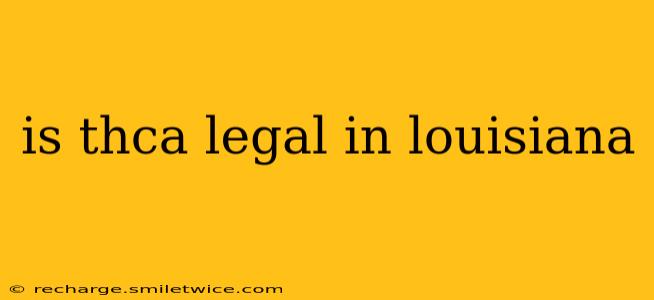The legality of THCA (tetrahydrocannabinolic acid) in Louisiana is a complex issue, shrouded in the evolving landscape of hemp and cannabis laws. While the state has legalized hemp, the specific legal status of THCA remains a grey area, leading to confusion among residents and businesses alike. This article will delve into the current regulations and provide clarity on this important topic.
Understanding the Distinction: THCA vs. Delta-9 THC
Before we explore the Louisiana regulations, it’s crucial to understand the difference between THCA and Delta-9 THC. Delta-9 THC is the primary psychoactive compound in cannabis that produces the "high." THCA, on the other hand, is a non-psychoactive precursor to Delta-9 THC. It converts to Delta-9 THC when heated (a process called decarboxylation), which typically occurs when consuming cannabis flower or concentrates.
Louisiana Hemp Laws: A Foundation of Confusion
Louisiana's hemp laws, based largely on the 2018 Farm Bill, legalize the cultivation and sale of hemp containing less than 0.3% Delta-9 THC by dry weight. This is where the confusion arises regarding THCA. While the law doesn't explicitly mention THCA, the total Delta-9 THC limit creates a challenge. Because THCA converts to Delta-9 THC, the total amount of Delta-9 THC (including what converts from THCA) must remain below the 0.3% threshold. This makes enforcement and interpretation tricky, leading to inconsistent practices across the state.
Frequently Asked Questions About THCA Legality in Louisiana
Here we address some commonly asked questions surrounding THCA’s legal status in Louisiana:
1. Is THCA legal in Louisiana if it's below 0.3% Delta-9 THC?
This is the core question, and the answer isn't a simple yes or no. While the intent of the law likely intends to allow THCA below the threshold, the ambiguity in the wording creates legal uncertainty. The key factor is the potential for conversion to Delta-9 THC, rather than the immediate presence of Delta-9 THC. Enforcement relies on testing methods that accurately measure the potential Delta-9 THC content after decarboxylation. Therefore, even if a product tests below 0.3% Delta-9 THC initially, it could still be considered illegal if testing shows it would exceed the limit after being heated.
2. Can I legally buy THCA products in Louisiana?
Currently, the legal landscape is precarious. Some retailers are selling THCA products, banking on the understanding that, if properly tested and below the 0.3% Delta-9 THC threshold after decarboxylation, they are legal. However, the lack of clear legal definition and consistent enforcement makes the legal risk for both the seller and buyer significant. It's advisable to proceed with caution and seek legal advice if considering purchasing or selling THCA products.
3. What are the penalties for possessing or selling illegal THCA in Louisiana?
Penalties for violating Louisiana's hemp and cannabis laws vary depending on the quantity involved and whether it’s considered a first offense. These could range from fines to imprisonment.
4. How does Louisiana’s THCA legality compare to other states?
The legal status of THCA varies greatly across states. Some states have explicit laws addressing THCA, while others have created a legal grey area similar to Louisiana. It's essential to check the specific regulations of each state before purchasing or possessing THCA products.
Conclusion: Navigating the Uncertainties
The legal status of THCA in Louisiana is currently undefined. While the intent of the law might seem to permit THCA below the 0.3% Delta-9 THC threshold, the practical application and enforcement remain inconsistent. This uncertainty makes it critical for individuals and businesses to proceed cautiously, relying on accurate lab testing and potentially seeking legal counsel before engaging with THCA products. This situation highlights the need for clearer and more specific legislation concerning THCA in Louisiana to provide regulatory clarity and protect both consumers and businesses. The legal landscape is ever-changing; staying updated on legislative developments is essential.
